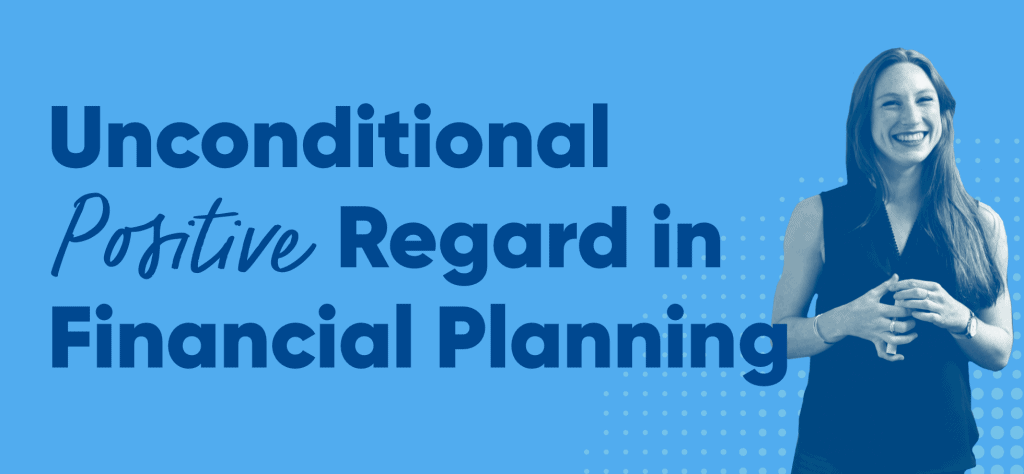Unconditional Positive Regard in Financial Planning

When you think about financial planning superpowers, you might automatically assume I’m talking about skills like strategic thinking or investment advice. However, I think the most important professional superpower doesn’t have anything to do with finances at all.
Instead, it’s all about how you see and treat people. All the financial skills in the world don’t mean much if you don’t apply them with empathy and goodwill. This is where unconditional positive regard comes in.
What is Unconditional Positive Regard?
Have you heard the term “unconditional positive regard”?
It’s essentially the basic acceptance and support of a person regardless of what the person says or does, and I think it’s a professional superpower.
Why? Because assuming the worst of people is much easier — and much less transformational.
Taking a Positive Outlook
It’s really easy to assign motives and intent to what people say, or to infer something about them based on past words or decisions.
For example, if your client has high credit card debt, it’s not so much about why it happened — it’s about what’s happening moving forward. With unconditional positive regard, we assume that our clients are trying to do better. Even if they make mistakes or continue to make decisions we wouldn’t recommend, we assume that they want to change. Our job is to support them, no matter what.

Assuming the best of your clients
This also helps us serve our clients better by setting a new perspective when clients are unhappy.
Let’s say you get an email from a client about following up — “I haven’t heard anything about XYZ, so I am just following up.” What you hear is that they’re angry or they think you’re a terrible planner.
But the truth is, if we use unconditional positive regard, we can hear that email in a new tone, where they’re genuinely just checking in. You have the opportunity to support them without being defensive.
Expecting the best brings countless benefits
When we think in terms like unconditional positive regard, we double-check the meanings we attach to conversations and body language. When we assume the best, it cuts through a lot of the self-doubt and reactivity we attach to our work.
Unconditional positive regard also reframes how we talk to clients, engage with our coworkers, and expand our skillset.
Plus, when you assume the best of everyone, your (professional and personal) life becomes a lot easier. What would shift for you if you felt like you assumed the best of people, instead of reading into things or jumping to conclusions?

I’ll tell you what would shift: You’d be happier and you’d be more excited to serve your clients. Your home life would probably be a lot better, too.
What’s your professional superpower?
So what do you think? Have you tried applying unconditional positive regard in your professional life? Has it simplified your work or improved your relationships? I’d love to hear about your experience or find out about your own professional superpower. Tell your story in the comments below!
Want more engagement with the financial planning community? Join the Amplified Planning email list. Our newsletter covers essential financial planning topics and key areas of discussion. Sign up today to be part of the conversation.
